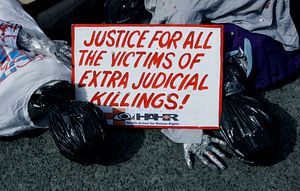Human rights watchdog Amnesty International has added its voice to the growing chorus of condemnation over extrajudicial killings in the Philippines, warning the International Criminal Court (ICC) must prosecute if the troubled country fails to deal with the issue.
A recent Amnesty investigation, If You Are Poor You Are Killed: Extrajudicial Executions in the Philippines’ War on Drugs details how police target mainly poor people, plant evidence, recruit killers, steal from the people they kill, and fabricate incident reports.
“This is not a war on drugs, but a war on the poor. Often on the flimsiest of evidence, people accused of using or selling drugs are being killed for cash in an economy of murder,” said Tirana Hassan, Amnesty’s Crisis Response Director.
Since President Rodrigo Duterte came to office seven months ago, there have been more than 7,000 drug-related killings, with the police directly killing at least 2,500 alleged drug offenders.
Amnesty’s investigation documents 33 cases involving the killings of 59 people. Researchers interviewed 110 people detailing extrajudicial executions in 20 cities across the archipelago. The organization also examined police reports.
The report documents how police, working from “unverified lists” of people allegedly using or selling drugs, stormed into homes and shot dead unarmed people, including those prepared to surrender.
“Fabricating their subsequent incident reports,” the report says, “the police have routinely claimed that they had been fired upon first.”
The evidence, according to Amnesty, directly contradicts police’s claims as witnesses told how police conducted late night raids, did not attempt an arrest, and opened fire on unarmed people. In some cases, witnesses said, police planted drugs and weapons they later claimed as evidence.
In one case, according to the report, in Batangas City a victim’s wife described how police shot dead her husband at close range as she pleaded for mercy. Police then dragged her outside and beat her.
In Cebu City, Gener Rondina watched as a large contingent of police officers surrounded his home. He appealed to them to spare his life and said he was ready to surrender. “The police kept pounding [and] when they go in he was shouting, ‘I will surrender, I will surrender, sir,’” a witness said.
Police ordered Rondina to lie on the floor as they told another person in the room to leave. Witnesses then heard gunshots ring out. A witness recalled them “carrying him like a pig” out of the house and then placing his body near a sewer before eventually loading it into a vehicle.
When family members were allowed back in the house six hours after Gener’s death, they described seeing blood splattered everywhere. Valuables including a laptop, watch, and money were missing, which had not been accounted for by police in the official inventory of the crime scene.
Gener’s father, Generoso, served in the police force for 24 years before retiring in 2009. He told Amnesty International he was ashamed of his son’s drug use. He also said he supported the government’s anti-drug campaign.
“But what they did was too much,” he said. “Why kill someone who had already surrendered?”
The Philippines is a party to the Rome Statute of the ICC. Last October, ICC prosecutor Fatou Bensouda, issued a statement expressing concerns over the killings and indicated her office might initiate a preliminary examination into possible crimes.
Hassan urged the Philippines to move away from lawlessness and lethal violence and reorient its drug policies toward a model based on the protection of health and human rights.
“What is happening in the Philippines is a crisis the entire world should be alarmed by. We are calling on the government, from President Duterte down, to order an immediate halt to all extrajudicial executions,” she said.
“We want the Philippines’ authorities to deal with this human rights crisis on their own. But if decisive action is not taken soon, the international community should turn to the Prosecutor of the ICC to carry out a preliminary examination into these killings, including the involvement of officials at the very top of the government.”
Luke Hunt can be followed on Twitter @lukeanthonyhunt

































